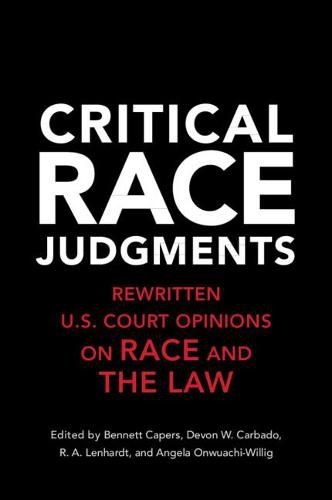Readings Newsletter
Become a Readings Member to make your shopping experience even easier.
Sign in or sign up for free!
You’re not far away from qualifying for FREE standard shipping within Australia
You’ve qualified for FREE standard shipping within Australia
The cart is loading…






By re-writing US Supreme Court opinions that implicate critical dimensions of racial justice, Critical Race Judgments demonstrates that it’s possible to be judge and a critical race theorist. Specific issues covered in these cases include the death penalty, employment, voting, policing, education, the environment, justice, housing, immigration, sexual orientation, segregation, and mass incarceration. While some rewritten cases - Plessy v. Ferguson (which constitutionalized Jim Crow) and Korematsu v. United States (which constitutionalized internment) - originally focused on race, many of the rewritten opinions - Lawrence v. Texas (which constitutionalized sodomy laws) and Roe v. Wade (which constitutionalized a woman’s right to choose) - are used to incorporate racial justice principles in novel and important ways. This work is essential for everyone who needs to understand why critical race theory must be deployed in constitutional law to uphold and advance racial justice principles that are foundational to US democracy.
$9.00 standard shipping within Australia
FREE standard shipping within Australia for orders over $100.00
Express & International shipping calculated at checkout
By re-writing US Supreme Court opinions that implicate critical dimensions of racial justice, Critical Race Judgments demonstrates that it’s possible to be judge and a critical race theorist. Specific issues covered in these cases include the death penalty, employment, voting, policing, education, the environment, justice, housing, immigration, sexual orientation, segregation, and mass incarceration. While some rewritten cases - Plessy v. Ferguson (which constitutionalized Jim Crow) and Korematsu v. United States (which constitutionalized internment) - originally focused on race, many of the rewritten opinions - Lawrence v. Texas (which constitutionalized sodomy laws) and Roe v. Wade (which constitutionalized a woman’s right to choose) - are used to incorporate racial justice principles in novel and important ways. This work is essential for everyone who needs to understand why critical race theory must be deployed in constitutional law to uphold and advance racial justice principles that are foundational to US democracy.